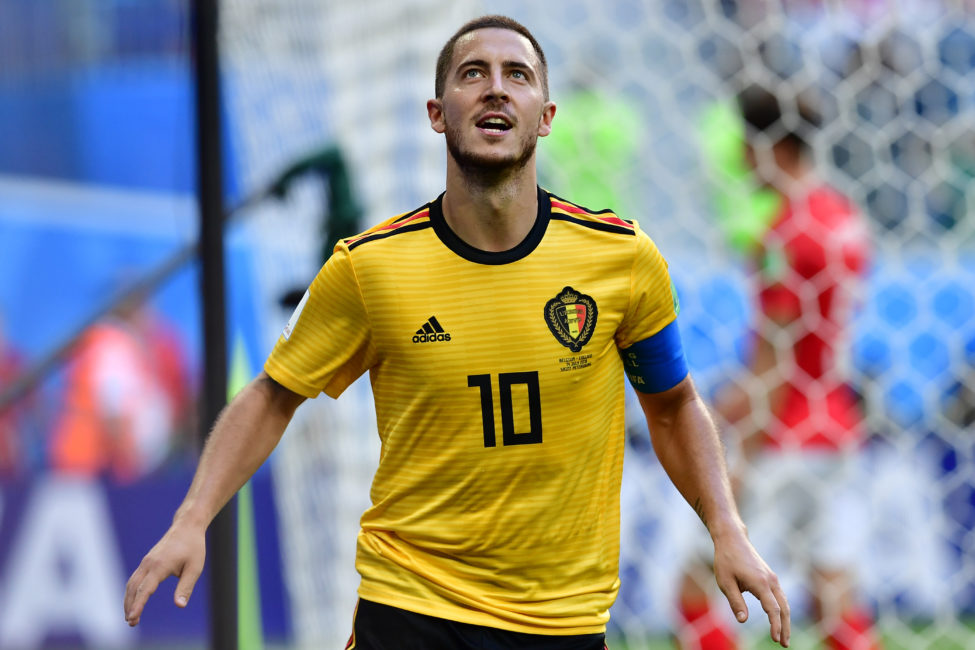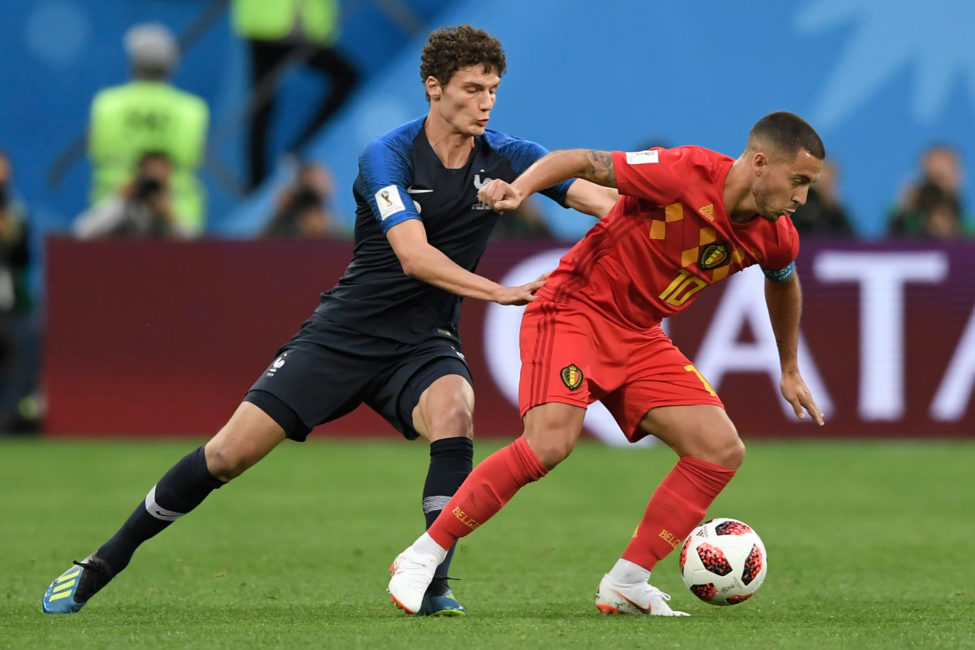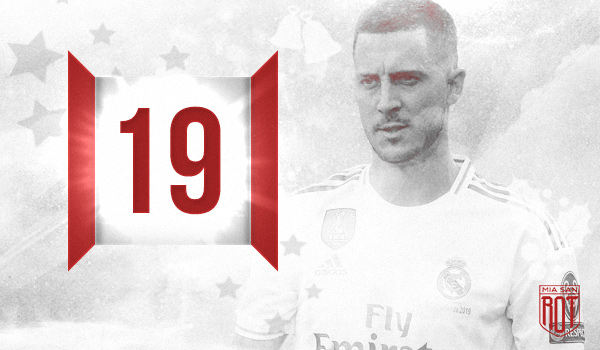The MSR advent calendar: Our favorite signings that never happened: Door 19 – Eden Hazard
The situation at the club
“Yes, that went quite well, but what will happen when Ribéry and Robben finally hang up their shoes?”
How often was this sentiment voiced in this or a modified form over the last decade? The same people who at first almost longed to see FC Bayern slide into a crisis as soon as “Robbery” left the club later expressed their dissatisfaction with how Bayern seemed to almost wantonly have missed out on looking for a replacement in time. They had relied on the two greatest wingers in the club’s history for way too long and actually needed real replacements long ago. Particularly the tabloids continually fueled the hope that FC Bayern would spend a lot of money to bring real world stars to the Bundesliga; players like Coman or Gnabry would hardly be enough to replace the great Franck and spectacular Arjen.
The idea of a “successor” for the two greats first came up in 2012 when Bayern signed Swiss powerhouse Xherdan Shaqiri as part of a broader squad expansion. Shaqiri was mainly a substitute who again and again and brought fresh impulses when he came on, but he also knew about his role as a squad player. In later seasons he had to realise that he might have joined Bayern too early.
At the same time, Ribéry’s was going to have his best season, which he capped off with winning the first treble in the club’s history, Robben would reach his peak in 2014. So while the premature and therefore not quite Robbery successor Shaqiri left the club, two further of their would be successors are still in the frame today: Kingsley Coman and Douglas Costa.
The story of the two is well known. They, as well as the later addition Serge Gnabry, have struggled with injuries time and again, and so the search for the ominous “Robbery successor(s)” was not over yet. Enter Eden Hazard.
The situation with the player
Franck Ribéry: the playmaker on the left wing
To understand what would have made Eden Hazard so different from all the rest of the wingers roaming this planet and such an interesting acquisition for FC Bayern in particular, you have to take a step back and consider Franck Ribéry’s special qualities.
Ribéry may be a left winger in name and position, but in fact he always was, throughout his career, a playmaker playing on the left wing.
If Philipp Lahm’s importance to his teams may have been something like a number 6 disguised as a full-back, Ribéry was a number 10 disguised as a winger. He started on the touchline and moved into the center to initiate and coordinate his team’s attacks in the final third in the purest manner of legendary French playmakers, playing deadly passes and collecting assists.
As clumsy as Ribéry was off the pitch (and in heated situations sometimes not only there), on the pitch he was one of the most intelligent, technically gifted wingers of his generation, his style of play largely unique. Only Messi comes close in terms of raw ability, but the Argentine spent most of Ribéry’s best years playing in the center.
In comparison, Arjen Robben was a pretty classic winger. He was similarly strong as a dribbler, but much more goal-oriented. That is not meant to diminish his value, not at all, but in the larger context of football history, Robben stands out more in terms of quality than style of play. The fact that his legitimate successors Serge Gnabry and Leroy Sané have already scored a good half-dozen goals in the best Robben style only serves to illustrate this.
With the exception of Messi, as I said, there has only ever been one player among the many, many wingers who has been able to execute this disguised number 10 role of Ribéry with similar aplomb: Eden Hazard.

(Image: Giuseppe Cacace/AFP via Getty Images)
Every Chelsea attack went through him. He dribbled and scored at will and when he was in the mood, Hazard was able to dominate a game all by himself, a capability that fundamentally set him apart from his league-wide competition on the wings. In contrast to his French counterpart, Hazard was a little more goal-oriented and always scored a few more goals than he provided assists, but in his involvement in the offensive game, in terms of touches and key actions for example, he resembled Ribéry in a striking way.
Over time, he also developed genuine leadership abilities. While he was still visibly struggling with his new role as team captain at the Euros in 2016, he seemed to be a born leader at the World Cup in Russia. With a broad chest, he led Belgium’s golden generation to a very good third place and was by far the best player of his team. Not even Franck Ribéry managed this, the ultimate achievement of becoming a true leader.
The hypothetical role in the team
As someone who has never been in favor of raiding club coffers for signing big world stars, Eden Hazard has been the big exception for me. He is the one player for whom I would have willingly accepted the madness of the transfer market, the player for whom I would have understood if Bayern had bitten the bullet and put a triple-digit million figure on the table.
Of course, this has a lot to do with the uneven up-and-down period the club went through between the Guardiola era and the current one under Hansi Flick. After the Catalan left, Bayern’s game was for a long time merely piecemeal, carried by individual players like Thiago, Kimmich or Lewandowski. At that time, these individual artists were needed to bring the team to a higher level and give structure to what was otherwise a mere collection of loose elements.
A question of timing
The question as to when Hazard should have been signed, if at all, is a pertinent one. In the same window as Xherdan Shaqiri, Hazard moved to Chelsea FC in the summer of 2012 for €35m. Bringing him in at that time as a replacement for Shaqiri would probably have been unrealistic. FC Bayern had debated Javi Martínez’s record fee of €40m for a long time internally, and it is hard to imagine that they would have paid almost the same amount again for a young backup winger. In addition, there is the question of how far a young Hazard could have developed in the shadow of Ribéry, who was in his absolute prime at that time.
A transfer in the summer of 2016 or 2017 seems more realistic to me. Hazard had just had the best season of his career up to that point in 2014/15, contributing 24 scorer points to Chelsea’s first championship in five years and being named the Premier League’s best player in the process. The next season, however, he and his club completely collapsed. The oldest of the Hazard brothers went without a goal in the league for over 2,000 minutes, ending the season with just eight goals. In December, coach Mourinho had to leave the club, and in the end they only finished tenth.
Yes, Hazard may have had a terrible season, but his talent and class were beyond questioning. At the time the price levels in the transfer market had already risen but not yet escalated completely. Chelsea had also missed out on the Champions League, so they could only offer a weaker sporting package than the German record champions. Of course, Roman Abramovich is not exactly short of money, but a transfer in the high double digit millions would not have been unrealistic for the 25-year-old Hazard.
But Ribéry and Robben had not yet reached the end of the line and there were still hopes that Douglas Costa’s poor second half of the season would only be a temporary dip. So Hazard stayed in London and vowed to make amends.
And amends they made. Under coach Conte they beat Pochettino’s Tottenham, Guardiola’s City and Klopp’s Liverpool in the championship, while Hazard found back to his old form and recovered his goal scoring nous, ending the season on 21 goals.

(Image: Gabriel Bouys/AFP via Getty Images)
Once again, there is room for speculation about a possible transfer to Bayern at this point. Even though he was to remain with Chelsea for two more seasons, Hazard’s path with the oligarchic club seemed to have come to an end, and speculation about a move away never ceased.
Bayern also recognised the need for attacking reinforcements as Real Madrid had brutally exposed their limits in the Champions League. Meanwhile, Ribéry in particular was increasingly struggling with athletic deficits, Douglas Costa had been summarily dismissed at the end of the season (something the club would rather not talk about today), and Coman was only signed after a seeming eternity of deliberation.
Eden Hazard would have been a near perfect successor for Robbery at the time. At 26 years of age but with rich experience, he would have been an immediate reinforcement. It is only the small matter of the transfer fee that would probably have nipped the whole idea in the bud. Right at this time the escalation of fees in the transfer market had reached ludicrous dimensions with Neymar set to move for €222m in the summer, which in its wake caused the market values of other players to explode, too. It is possible that Bayern would still have ended up paying less than the €146m that Real Madrid were ultimately going to shell out for Hazard in 2019, but the fee would certainly have been in triple figures nonetheless.
The ‘what if’ outlook
Had Bayern brought him in, they could have replaced Ribéry like for like. Together with Coman, Robben and, a little later, Gnabry, they would then have had a nominally first-class offensive. However, that would not have changed anything about the tactical deficits first under Ancelotti and later Kovač. But for the hero football of the time, at least the necessary heroes would have been there. It is quite possible that various coaches would have stayed in their jobs longer, and it is also quite possible that head coach Hansi Flick would have been prevented in this way.
In the end, Ribéry and Robben were replaced by relocating the heart of the team. In the second treble season in the club’s history, the wide players also played a vital part, but the backbone of the team now lay in the centre, encompassing Alaba, Thiago, Lewandowski, Müller, and mostly Kimmich.
Eden Hazard, however, would have been the obvious, to some extent uncreative, murderously expensive, and definitely spectacular answer to the search for the heir apparent to emperor Franck Ribéry. An answer that even the great winger himself approved of.
Hint: Behind the next door there will be one of the hottest flirts of Bayern’s modern transfer policy. A flirtation that continued to reverberate for a long time, all the while never quite losing its currency, especially in the media.









